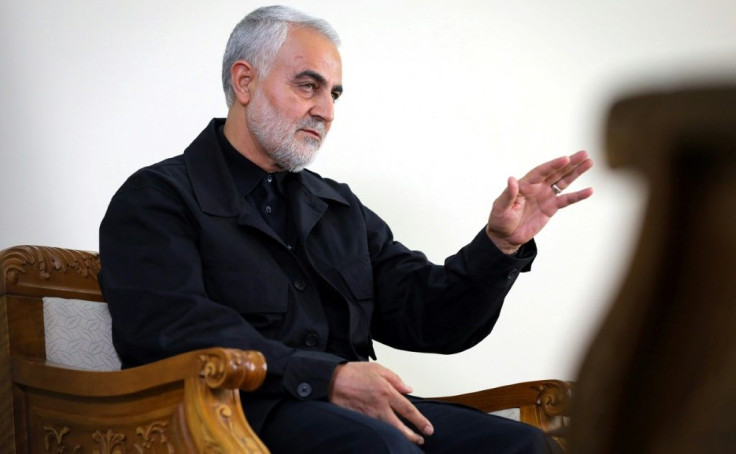Friday's Stock Market Open: US Equities Fall, Oil Prices Jump After US Airstrike Kills Iranian Commander

KEY POINTS
- Crude oil futures jumped as much as 4% after the killing of Soleimani
- Various Iranian figures have threatened to retaliate for the killing
- Fears grow that Iran may launch attacks on oil infrastructure in Middle East
U.S. stocks traded lower and crude oil prices surged Friday after an U.S. airstrike killed Iran’s top commander in Baghdad on Thursday, sparking fears of retaliation by Iran and the potential for all-out war.
The Dow Jones Industrial Average dropped 180.71 points to 28,688.09 while the S&P 500 fell 16.13 points to 3,241.72 and the Nasdaq Composite Index dipped 50.26 points to 8981.32.
Crude oil futures rose 2.08% at $62.45 per barrel and Brent crude jumped 2.57% at $67.95. Gold futures gained 1.57%.
An U.S. air strike in Iraq killed top Iranian commander General Qasem Soleimani in Baghdad on Thursday. Also killed was Abu Mahdi al-Muhandis, deputy commander of an Iran-backed militia in Iraq called the Popular Mobilization Forces,
Iran has vowed revenge for the killing. Iranian Foreign Minister Mohammad Javad Zarif called the targeted killing of Soleimani “extremely dangerous and a foolish escalation.”
“The U.S. bears responsibility for all consequences of its rogue adventurism,” Zarif tweeted.
“A crushing revenge will be taken for Soleimani’s unjust assassination. We will take revenge from all those involved and responsible for his assassination,” Iranian Defense Minister Amir Hatami said.
Analysts were also concerned by the escalation of tensions between the U.S. and Iran.
“Global oil markets will be volatile for weeks to come,” said Greg Valliere, chief U.S. policy strategist at AGF Investments, in a note. “There’s a reason, finally, for caution in the stock market. Eventually there will be an uneasy truce ... But that’s a long, long way off; this will get worse before it gets better.”
Stephen Innes, chief Asia market strategist for AxiTrader, wrote in a note: “This is more than just bloodying Iran’s nose. This is an aggressive show of force and an outright provocation that could trigger another Middle East war. Indeed we are waking up to a less safe world than it was only hours ago.”
Dryden Pence, chief investment officer at Pence Wealth Management, told CNBC: “It’s a game-changer. We’ve been able to weaponize economic sanctions now where we can go after individuals, but now I think the ultimate sanction that the president [Trump] is able to use is an airstrike.”
But Pence added that any market volatility “will be short-lived.”
Helima Croft, head of global commodity strategy at RBC Markets, told CNBC: “This brings us to the precipice of a full blown shooting war with Iran — not a shadow war or a proxy war. It is almost impossible to overstate the implications of this event.”
Matthew Bey senior global analyst at Stratfor, said Iran is likely to retaliate by supporting attacks on oil infrastructure in the Persian Gulf and others parts of the Middle East.
“This is a watershed moment in the struggle between Iran and the U.S. in the Middle East,” said Emily Hawthorne, Middle East and North Africa analyst at Stratfor. “Striking Soleimani, the head of Iran’s overseas military operations, is a significant attack on Iran’s ability to direct proxy warfare and will be met with Iranian retaliation against the U.S.”
“We expect moderate to low level clashes to last for at least a month and likely be confined to Iraq. Iranian-backed militias will attack U.S. bases and some U.S. soldiers will be killed; the U.S. will retaliate with strikes inside of Iraq,” said Henry Rome and Cliff Kupchan, analysts at the Eurasia Group.
Rome and Kupchan added: “Iran is unlikely to immediately attack Saudi or Emirati oil infrastructure or U.S. bases in Saudi Arabia, the [United Arab Emirates], Bahrain, or Qatar. These steps would have the effect of unifying the Gulf against Tehran; Iran will instead target its ire against Washington in the near term.”
The price of oil, Rome and Kupchan noted, “will likely hold” at about $70 a barrel, “but could make a run at $80 if the conflict spreads to the oil fields of southern Iraq or if Iranian harassment of commercial shipping intensifies.”
In economic data, The Institute for Supply Management said its manufacturing index fell in December to 47.2 – the lowest such level since June 2009, whet it was at 46.3.
Construction spending during November 2019 rose 4.1% from the year-ago period, and 0.6% above the revised October 2019 estimate.
During the first eleven months of 2019, construction spending was 0.8% below the amount for the same period in 2018.
Overnight in Asia, markets finished mixed. China’s Shanghai Composite slipped 0.05%, while Hong Kong’s Hang Seng fell 0.32%, but Japan’s Nikkei-225 dropped 0.76%.
In Europe markets finished mixed, with Britain’s FTSE-100 up 0.24%, France’s CAC-40 rose 0.04% and Germany’s DAX dropped 1.25%.
The euro edged up 0.02% at $1.1174 while the pound sterling dropped 0.38% at $1.3087.
© Copyright IBTimes 2025. All rights reserved.





















